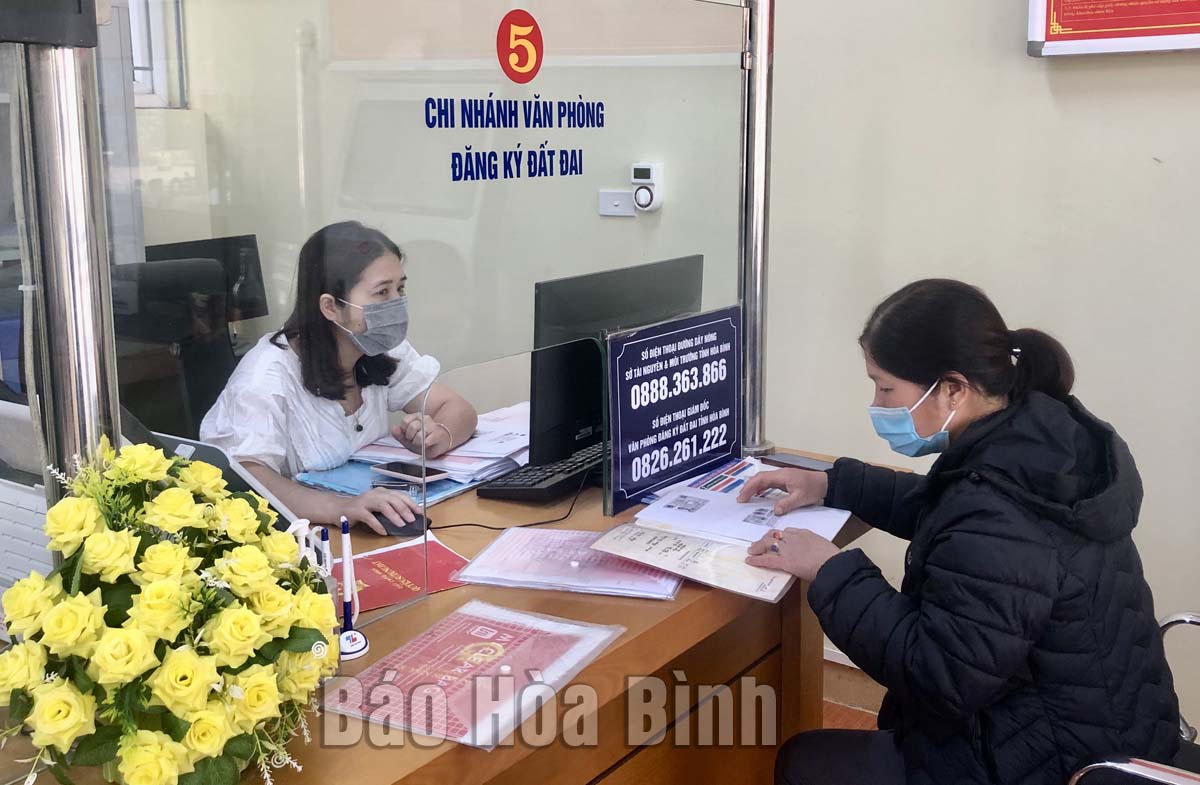
(HBO) – Sectors and agencies in Mai Chau district have recently paid special attention to promoting administrative reform, towards developing a democratic, modern administration.
The scheme is expected to contribute to better serving the people, creating a motivation for further promoting socio-economic development of the locality.
Local people at the department of receiving dossiers and returning results at the Mai Chau District People's Committee.
The departments of receiving dossiers and returning results of the district, communes and towns have been consolidated, while civil servants have been appointed in line to regulations to promptly process administrative dossiers for organisations and citizens.
The district People's Committee has effectively deployed document administration software for agencies, units, People's Committees of communes and townships; managed and make good use of the email account, and effectively operate the portal.
The citizen reception, and the implementation of administrative reform in the district have been regularly inspected, while the online public services at level 3-4 have been promoted.
According to Mrs. Ha Minh Huyen, a staff in charge of the field of culture, sports and tourism; and labour, invalids and social affairs at the district’s department of receiving dossiers and returning results said the one-stop shop department of the district receives many administrative dossiers of local people every day.
Thanks to efforts to accelerate the administrative reform, in the first six months of 2022, the department of receiving dossiers and returning results of Mai Chau district received 8,903 dossiers, with 8,835 of which being processed online. As many as 7,784 dossiers were processed ahead of the deadline, while 979 those addressed on time.
Chairman of the district People’s Committee Nguyen Van Lam said the local authority has focused on speeding up simplification of administrative procedures; and regularly evaluate the performance of duties of official, civil servants and public employees; and making it easier for people to contribute their opinions, thus developing a modern and democratic administrative system./.
The Standing Board of the Hoa Binh provincial Party Committee has agreed in principle on a proposal by the Standing Board of the Party Committee of Hoa Binh city to gather feedback on the city’s 1:2000 zoning plan, which forms part of its broader urban development strategy.
Hoa Binh province has made notable progress in public administration reform and digital government development, with the satisfaction index among citizens and businesses reaching over 84%, according to recent government evaluations.
Thanks to great efforts by local authorities in recent times, the governance and public administration performance of Mai Chau district has been significantly improved.
In the afternoon of June 6, the Party Committee, the People's Council, the People's Committee and the Fatherland Front of Lac Son district solemnly held a meeting to celebrate the 139th anniversary of the district's founding (1886–2025) and the 79th anniversary of the establishment of the district's Party Committee (1946–2025). There was the attendance of Mr. Bui Van Thang, the Vice Chairman of the Provincial People's Council; Mr. Quach Tat Liem, the Vice Chairman of the Provincial People's Committee; Ms. Dang Bich Ngoc, the Deputy Head of the National Assembly Delegation of the province; as well as the former leaders of the province and district through various periods, who are the natives of the district.
Implementing the Politburo’s Resolution No. 57-NQ/TW on breakthroughs in science – technology, innovation, and digital transformation is a golden opportunity for the northern mountainous province of Hoa Binh to renew growth model, improve competitive edge and shorten digital gap.
Resolution 57-NQ/TW, issued by the Politburo on December 22, 2024, identifies sci-tech, innovation, and digital transformation as strategic breakthroughs to build a developed and prosperous nation. In Hoa Binh province, this spirit is not just a slogan, it’s being put into action through concrete initiatives that form a "new development triangle”: digital citizenship, digital economy, and digital administration.



